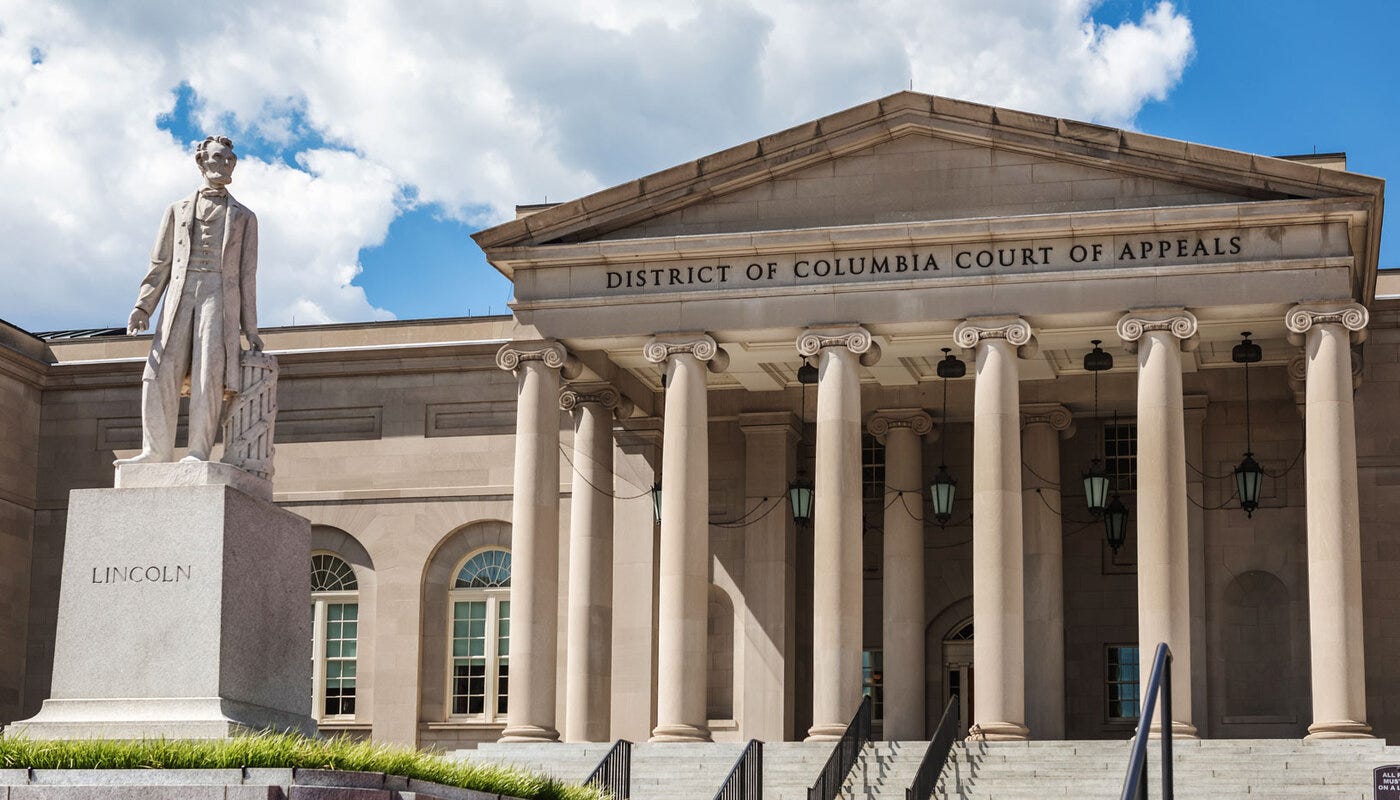Jane Doe, et al. v. Donald J. Trump, et al.: Affirming the Trump Administration’s Power to Set Prison Policy
In a legal saga that underscores the tension between judicial oversight and executive authority, the Trump Administration has filed an appeal challenging a federal injunction.
The ongoing legal battle in Jane Roe v. Donald J. Trump originating in the U.S. District Court for the District of Columbia and now under appeal in the U.S. Court of Appeals for the District of Columbia Circuit, presents a clear case for upholding the Trump Administration’s authority to set prison policy. The administration’s appeal of a nationwide injunction blocking its directive to house male prisoners with gender dysphoria in male facilities should be seen as a rightful assertion of executive power under Article II of the Constitution. This argument rests on the executive branch’s constitutional and statutory authority, the limits of judicial overreach, and the practical necessity of administrative discretion in prison management—culminating in a strong case for reversing the injunction and confirming the administration’s policymaking power.
Constitutional and Statutory Foundations of Executive Authority
Article II of the Constitution vests the executive power in the President, encompassing the authority to manage federal agencies like the Bureau of Prisons (BOP), a division of the Department of Justice named as a defendant alongside former President Donald J. Trump. This power includes the ability to set policies governing the operation of federal prisons, as explicitly supported by 18 U.S.C. § 4042, which charges the BOP with the "management and regulation" of all federal penal institutions. The Trump Administration’s policy—mandating that male inmates with gender dysphoria be housed in male facilities based on biological sex—is a direct exercise of this authority, reflecting a rational approach to classification and security.
The plaintiffs, Jane Doe and other transgender inmates, argue that this policy infringes on their constitutional rights, prompting the district court’s injunction. However, the executive’s prerogative to interpret and implement its statutory mandate should prevail absent a clear violation of law. The administration’s policy does not deny medical treatment or other accommodations for gender dysphoria; it simply establishes a uniform housing standard. This falls well within the BOP’s discretion to balance inmate welfare with operational needs, a power Congress has delegated to the executive, not the judiciary.
Judicial Overreach and the Nationwide Injunction
The district court’s decision to issue a nationwide injunction in Jane Doe, et al. v. Donald J. Trump, et al. represents an unwarranted intrusion into executive territory. District courts are courts of limited jurisdiction, designed to adjudicate specific disputes—here, the claims of Jane Doe and her co-plaintiffs—not to dictate national policy. By halting the administration’s prison housing rule across all federal facilities, the U.S. District Court for the District of Columbia exceeded its authority, effectively legislating from the bench. The Trump Administration’s appeal to the D.C. Circuit rightly challenges this overreach, arguing that such sweeping injunctions undermine the executive’s ability to govern uniformly and efficiently.
The Supreme Court has increasingly questioned the propriety of nationwide injunctions, as seen in Trump v. Hawaii (2018), where Justice Thomas warned they "prevent the Government from enforcing a policy it believes is necessary." In this case, the administration believes its policy enhances prison safety and administrative clarity—judgments rooted in executive expertise. The D.C. Circuit should recognize that allowing a single judge to paralyze a national policy disrupts the separation of powers, tilting the balance toward judicial supremacy over executive action. Reversing the injunction would restore the administration’s rightful authority to set prison policy without undue interference.
Practical Necessity of Executive Discretion in Prisons
Prison management demands flexibility and decisiveness—qualities inherent to the executive branch, not the judiciary. The BOP oversees a complex system where housing decisions impact security, resource allocation, and inmate safety. The Trump Administration’s policy reflects a practical choice: using biological sex as a consistent, objective criterion avoids the logistical challenges of individualized gender identity assessments in a high-stakes environment. Courts have long deferred to such executive judgments, as in Bell v. Wolfish (1979), where the Supreme Court upheld prison policies based on administrators’ "expertise in the operation of correctional facilities."
The plaintiffs’ contention—that the policy risks harm to transgender inmates—does not negate the administration’s authority. The executive retains the power to weigh competing interests and craft solutions, subject to constitutional limits. Here, no evidence suggests the policy violates the Eighth or Fifth Amendments; it merely prioritizes operational efficiency over subjective identity claims. The D.C. Circuit should affirm that the administration, not the courts, is best positioned to make these calls, reinforcing the executive’s role as the primary policymaker in prison affairs.
The Proper Check: Congress, Not Courts
If the policy is flawed, the remedy lies with Congress, not judicial fiat. Article I empowers the legislative branch to redefine prison policies or impose specific protections for transgender inmates if it deems the administration’s approach inadequate. Absent such action, the executive’s interpretation of its authority under existing law should stand. The district court’s injunction bypasses this democratic process, substituting judicial preference for executive discretion. The appeal offers the D.C. Circuit a chance to correct this imbalance, affirming that Article II—not judicial overreach—governs administrative policymaking.
Conclusion: Confirming Executive Power
As of April 2, 2025, the appeal in Jane Doe, et al. v. Donald J. Trump, et al. before the U.S. Court of Appeals for the District of Columbia Circuit is a pivotal test of executive authority. The Trump Administration’s policy on housing male prisoners with gender dysphoria is a legitimate exercise of its Article II powers, supported by statutory mandates and practical necessity. The district court’s nationwide injunction, by contrast, oversteps judicial bounds, encroaching on the executive’s domain. Upholding the administration’s appeal would confirm its power to set prison policy, ensuring that the BOP—and by extension, the President—can govern federal institutions without being shackled by lower courts. This outcome would not only vindicate the administration’s specific policy but also reinforce the broader principle that executive authority, not judicial activism, drives administrative governance.




